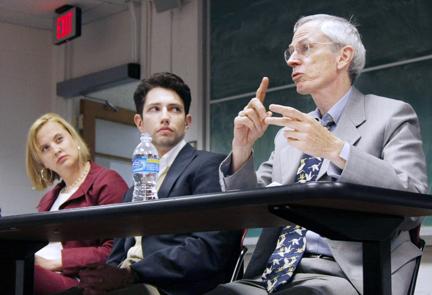Following the election of President Barack Obama in November of last year, the four students expressed their disappointment the the election results by writing controversial messages in the Free Expression Tunnel.
The statements found written in the tunnel have been called everything from free speech to a hate crime in the months past and the controversies from the event has led to many debates and discussions on campus regarding the First Amendment.
To get more perspective, the University pre-law services joined with the American Civil Liberties Union of North Carolina to bring four law experts from around the state to debate what the First Amendment has come to mean to universities across the state.
Matthew Quinn, the editor-in chief of the Campbell Law Review and the debate’s moderator, opened the debate by describing the Free Expression Tunnel as an open forum, a location where anybody can express their feelings about any issue. He then asked a question regarding the freedom of the tunnel.
Katy Parker, a representative from the ACLU of N.0.C, said she was in support of the freedom of the tunnel.
“I walked through [the tunnel], and it made me want to be in college again. It was free, and fun,” Parker said.
Parker went onto explain that a college campus should be the biggest supporter of free speech.
“Speech codes would prevent students from discussing issues, which would prohibit students from getting a well-rounded education outside of the classroom,” she said.
Michael Curtis, a professor from Wake Forest Law School, said he supported the purpose of the tunnel to an extent.
“We have a very protective first amendment, but it does not protect threats. That is a well established first amendment exception,” he said,
Shannon Gilreath, a professor from Wake Forest Law School, thought the term did not accurately represent the issues behind the Free Expression Tunnel.
“Hate speech is not a broad enough term to encompass all that should not be protected by the first amendment,” Gilreath said.
Gilreath also said he feels speech undermines the right to equality.
“Words create castes,” he said. “Equality and speech should be able to contend evenly on one plane.”
Parker said the issues of free speech weren’t that simple.
“Yes, the statements written in the tunnel were extremely offensive,” she said. “But students came and shared their opinions on current issues, which is what should happen on a college campus.”
Gregory Wallace, a professor at Campbell Law School, ended the debate and the event with an axiom calling for more discussions on the issue.
“The best cure for bad speech is not less speech, but more speech.” Wallace said.








